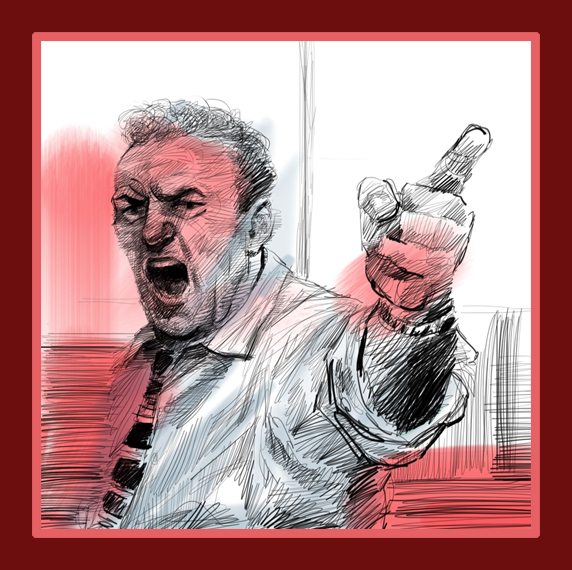A current exhibit at our Missouri History Museum in St. Louis shows what our city was like in 1875. Elaborately displayed throughout several galleries, it is a sociological education about life’s ups and downs in the late 19th century. St. Louis was the fifth largest city in America in 1875, before being overtaken by that hog butchering stacker of wheat 300 miles north on Lake Michigan.
Among the galleries focusing on city life, health, public works, fashions, trades, societal ills, and such, is a display about language, particularly slang and provincial terminology. Here in St. Louis we will always drink soda rather than pop, eat with knife and fark, and warsh our hands before meals.
That got me to thinking about language and the art of speaking. I like old movies and their lingo. Old films abound in cheap patter, rapid-fire wit, and snappy dialogue now considered archaic and quaint. I find it all very entertaining.
That Lee J. Cobb drawing featured above is borrowed from my Movie Still Sketchbook. This courtroom scene is from 12 Angry Men, depicting one of Cobb’s loud mouthed arguments. The charm of a Lee J. Cobb performance was his ability to deliver wrath-laden speeches that were harsh but oddly humorous.
I’m drawn to creative language. For me it drives a point better than “just the facts”. Often there is a whimsical frivolity to colorful lingo. I’m not talking about obscenity, but interesting words and phrases, especially ones no longer in use.
The St. Louis exhibit had audio representing slang in a variety of situations. It compared the slang of 1875 to that of 2015. Most is amusing to modern ears. I find it ill-mannered to tell anyone to “shut up”, but I’m happy to say I’ve never told anyone to “shut their bazoo!”. Yet, the latter has an air of whimsy that the former lacks. I guess a “bazoo” is a mouth. That command is equally blunt, but “bazoo” sounds funnier.
Another audio represented a woman threatening to show a “masher” her “mitten”. I’m not sure if that meant “talk to the hand” or implied a more serious threat, maybe a slap?
I’ve spent considerable time watching old movies. The literacy in these movies can be compared to well written novels. Many were based on books, while others were the original product of talented screenplay writers. Staccato rhythms punched the air in these black and white contests between good and evil, poor and privileged, earthling and alien. These people knew what to say and wasted no time saying it.
My Christian beliefs can be hard to reconcile with certain uses of language. Obscenity, sarcasm, hate-speech, any and all verbal abuse, are generally not acceptable means of building relationships and treating others with love. What I might consider “direct”, plain, or even colorful, may enter another’s ears as an abusive harangue. My witty turn of a phrase may be little more than a degrading put down. What I find funny or clever on film may be unnecessarily cruel in real life.
So what should I make of slang, colorful language, and wise-cracking retorts?
It seems we simply can’t, or won’t, avoid it. We may try to minimize it, but we will likely use it, especially when our emotions run high. When the character portrayed by Lee J. Cobb feared justice would be denied, he could not help but deride his fellow jurors as a “bunch of bleeding hearts” before delivering a scathing judgment on their frightfully careful deliberation.
Fear has a way of voicing itself in unsettling ways. It almost always confuses us and compels us to say things differently than our cooler minds might prefer. In my opinion, few works of art express fear more colorfully than the Bible’s Psalms.
One example in the Psalms is a colorful and unflattering descriptions of “the arrogant”, with “bodies, fat and sleek”, and whose “eyes swell out through fatness. . .”. That same poet admits he himself suffered bitterness in his soul that led him to behave like an ignorant brute acting beastly toward God.
There are many Psalms that vividly express frightened confusion. They do not soften descriptions of arrogant, abusive, people, scoffers, and those who ridicule and dismiss God and his people. I would not call these whimsical, but like the patter of those old movies, I consider that they give unqualified voice to emotional outbursts, angst, and disoriented fear.
The Psalms do correct emotional overdrive. Like the voice in the jury room wilderness who encouraged 11 angry men to calm down long enough to reexamine evidence, the Psalms call us to ponder anew, what the Almighty can do. I will admit I’m comforted to know that considerable time is given to confused, and expressive, language.
No doubt the fast mouths of those old film characters could have benefited from the correction of the Psalms. But maybe some of the stoic self-restraint imposed by emotionally stifled religionists could use a little honest mouthing off before resigning to a deadness of heart that fears to feel. Or, as they may have said in 1875, it might be better to “Open your bazoo”!

